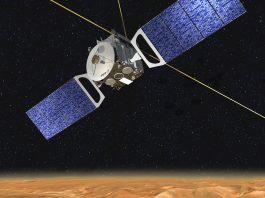Participants in the 2020 European Rover Challenge (ERC) Martian rover competition are embracing curiosity and seizing opportunity.
The COVID-19 pandemic has wreaked havoc across all branches of the economy worldwide, leaving some of them profoundly impacted for the foreseeable future. The space industry has not been insulated from the virus either; and some Space 4.0 startups have declared bankruptcy. The most important events of the space year were at best rescheduled and at worst cancelled indefinitely. What brings a little consolation is the fact that the companies whose employees could work from home made that shift quite effortlessly – and that makes sense, seeing as remote work and the space sector go hand in hand.
In March 2020, NASA’s Curiosity Mars rover mission team photographed themselves on their first day of working remotely from home. It could not have been an easy transition given how quickly it happened. But Curiosity was waiting on the Red Planet ready to be operated, so what else could NASA engineers do?
In September, nearly 400 young and ambitious engineers from all around the world will share a very similar experience to the one the Curiosity team encountered a few months ago. While staying in their countries, they will take part in the grand finale of the sixth edition of ERC, the international Martian rover competition. Between 11 and 13 September 2020, the contestants will participate in the competition; remotely navigating a mobile robot on the biggest artificial Martian field in the world, located in Poland. The MarsYard is designed to resemble the Jezero Crater, the exact location of the landing of NASA’s Perseverance rover next year.
What will the ERC 2020 competition entail?
61 teams have submitted their application in the registration process of ERC 2020. Based on the technical documentation they sent, the jury qualified 33 teams from 14 countries to move on to the final stage of the competition. Next month, the teams will compete in two field tasks using an innovative remote-robot management platform delivered by an American startup from Silicon Valley and mobile inspection robots built by a Polish company. Field tasks will include photographing objects from the MarsYard as well as performing servicing operations at the target machine located on the Martian field.
The teams will control the robots equipped with a navigation system based on wheel odometry (the use of data from motion sensors to estimate how far the rover has travelled) and IMU (Inertial Measurement Unit) which is a combination of an accelerometer and a gyroscope. Moreover, participants will have two cameras at their disposal, including a stereovision one that simulates human binocular vision and therefore gives the ability to perceive depth. That will help teams estimate the distance to various checkpoints and obstacles. However, in order to use that feature, the teams need to prepare their own software prior to the competition. The more autonomous their rover is, the bigger the chance of successfully completing the tasks and moving higher in the final ranking.
Lucas Wilczynski, founder and CEO of the European Space Foundation which is the main organiser of the ERC competition, said: “The ERC competition has always been a unique challenge – both in engineering and programming. Remote simulations are a standard of the space industry and most certainly the future of the robotic sector. We are very excited that the new formula of our tournament brings us even closer to the way the high tech sectors test their new solutions on a regular basis. In that sense, the global pandemic didn’t force us to change the logistics of the competition, it merely accelerated what we have thought about for a long time.”
The teams that score the most points will be awarded a place on the podium. Apart from the traditional gold, silver, and bronze medals, the organisers have also developed additional distinctions. Three teams have already been granted the Best Design Award in recognition of their professionalism, interdisciplinary approach, and the excellent preparation of technical documentation in accordance with the ERC 2020 rules.
The grand finale of the sixth edition of ERC Space and Robotics Event will take place between 11 and 13 September 2020. The three-day competition will be accompanied by live transmission and the commentary studio; hosted both in Polish and English. The streaming will be broadcast on the ERC website: https://roverchallenge.eu/.
The ERC competition is organised under the honorary patronage of the European Space Agency (ESA) and supported by the Polish Ministry of Science and Higher Education.









